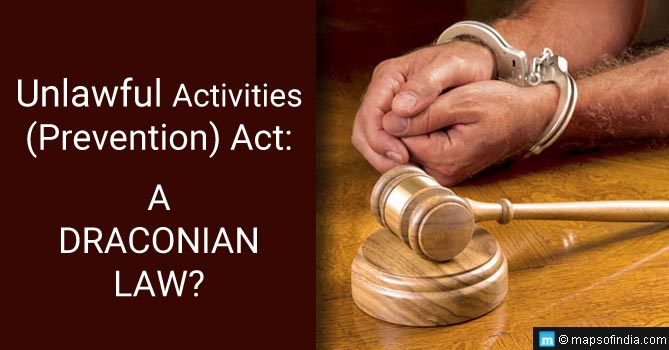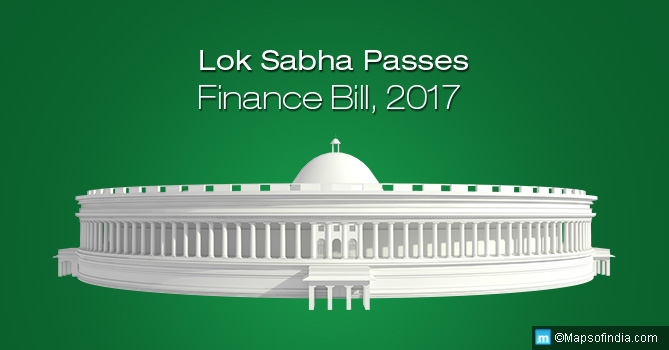हिंदी में पढ़ने के लिए यहां क्लिक करें
Unlawful Activities (Prevention) Act: A Draconian law?
On 28th August, 2018, five people from across the country were arrested by the police. Of the five arrested were – lawyer Sudha Bharadwaj, renowned Tamil poet Varavara Rao, activists Arun Ferreira, Gautam Navlakha and Vernon Gonsalves. The arrests are being seen as the second edition of the June, 2018, arrests of five people- human rights activists and one prominent lawyer. In 2010, Binayak Sen, the Vice President of People’s Union for Civil Liberties, was arrested and sentenced to life imprisonment, although later granted bail by the Supreme Court.
What is the one thing they all have in common? While the list of total people charged till date has several other names, the cases of the eleven people mentioned here were put under the Unlawful Activities (Prevention) Act, 1967. So, what is this Act that keeps on going in and out of our newspaper headlines and why are more and more people criticizing it?
What is the Unlawful Activities (Prevention) Act (UAPA), 1967?
UAPA, 1967 is an Indian law, aimed at targeting unlawful activities and associations within the country. The law puts ‘reasonable’ restrictions on certain constitutional rights, such as:
1) Freedom of speech and expression,
2) Right to assemble peacefully and without arms; and
3) Right to form associations or unions.
Back when it was first introduced, the aim was to have provisions for preventing the activities of any associations that sought secession from India, and to deem them unlawful. Consequently, it became one of India’s most important laws for national security. The law has since then been amended on several occasions.
An amendment in 2004 incorporated several provisions from the Prevention of Terrorism Act (POTA), 2002. The mentioned law had been withdrawn from the Parliament post several appeals for the same. It is under the same law that the Communist Party of India (Maoist) has been banned in the nation.
Why is UAPA criticised?
Like Section 124A of the Indian Constitution, that deals with sedition, UAPA, 1967 is largely taken under the hammer for its loose-ended definitions that leave alarming loopholes for the judiciary. Another criticism is for the massive power it hands over to those who in all likeliness can misuse it.
When Jaison C Cooper, a famous blogger from Kerala, was picked up from his workplace and put in police custody, the allegations against him raised several voices of protest. He was said to have been “spreading Maoist thought”, and the evidence against him constituted of “pro-maoist” literature seized from his house. The Act he was charged under, was yet again the notorious UAPA, 1967. Condemning the incident, Arun Ferreira and Vernon Gonsalves wrote that the “UAPA provisions criminalize thought”. The two have been known for their strong stand against the Unlawful Activities (Prevention) Act. Ironically, it was under the same law that the two were charged under, consequently in August, 2018.
When the Act was introduced, it was to “safeguard India’s integrity and sovereignty”. However, the recent years have seen a sharp rise in questions being posed against this law, many openly calling it Draconian and a threat to the country’s intrinsic values. The terms like “unlawful association”, “unlawful activity” etc are so vague, that it is possible to declare nearly any organisation illegal.
Misuse of the law
In 2011, when the hearing for Binayak Sen’s case was still ongoing, a group of 40 Nobel laureates from 12 countries signed a petition, demanding that Sen be released on bail immediately. When he was charged and accused for his “maoist links”, reportedly the only evidence against him were unsigned letters that showed direct correspondence with the banned CPI (Maoist).
On several occasions, people have been charged under the Unlawful Activities (Prevention) Act, and later on freed from all the allegations. Ajai Sahni, the executive director of the Institute for Conflict Management calls it “punishment by trial”. In other words, even if the all the charges are proven false and lifted, the process of reaching there is slow and troublesome, courtesy of the lacks in our judicial system.
One major argument that is often posed against the law is that, even if it is applied in the most extreme of cases where it is genuinely required, there should be a sunset clause as was the case with other laws like POTA. A sunset clause basically means that when the threat mentioned in the legislation observes the necessary drop, there is no longer a need for the said legislation. Moreover, if the law is indeed kept and not brought down, it should definitely introduce progressive amendments to eliminate the vagueness involved.
The Unlawful Activities (Prevention) Act, 1967 has provisions for detention lasting 180 days without any chargesheet, and for police custody up to 30 days. Moreover, it keeps an anticipatory bail out of the question. Thus, when a law as powerful as this one is kept intact in the Constitution of the country, one that has powers to suspend basic freedoms like freedom of speech, it should be seen to that it is not misused.
Like the Supreme Court said in response to the recent arrest of activists, “Dissent is the safety valve of democracy”.
हिंदी में पढ़ने के लिए यहां क्लिक करें






